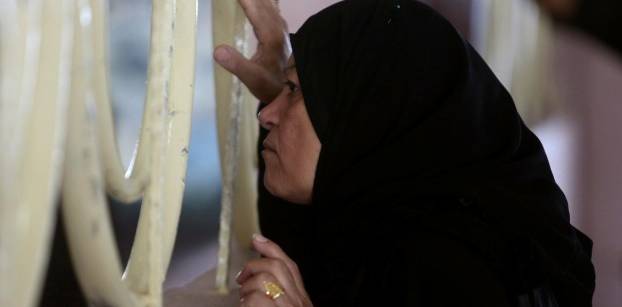Egypt opens Rafah border crossing ahead of Shukri's visit to Ramallah

A woman looks through a window as she waits for a travel permit to cross into Egypt through the Rafah border crossing after it was opened by Egyptian authorities, in the southern Gaza Strip June 29, 2016. REUTERS/Ibraheem Abu Mustafa
CAIRO, Jun 29 (Aswat Masriya) – The Egyptian authorities have opened the Rafah border crossing with Gaza for Palestinians on Wednesday, for four days, as the country's foreign minister is set to visit Ramallah.
Stranded Palestinians and people “with humanitarian cases” will be allowed to enter and exit Gaza, Egypt's state-run news agency MENA had said on Monday.
The Gaza Strip has been under a land, air and sea blockade enforced by Israel since 2007, after the Palestinian Islamic Resistance Movement (Hamas) won the Palestinian legislative election and took control of the strip.
The Rafah border crossing connects Egypt’s Sinai to the besieged Gaza Strip and is the strip's main entry and exit point. Gaza, which is home to 1.8 million people, also borders Israel.
The crossing was last opened earlier in June for four days.
Since former Egyptian president Mohamed Mursi, who hails from the Muslim Brotherhood, was militarily ousted in July 2013 following mass protests against his rule, Egypt has kept the Rafah crossing mostly closed, and has opened it for Palestinians only partially and sporadically.
Egypt’s relations with the Palestinian movement Hamas have been strained since Mursi’s ouster. Hamas, which controls the Gaza Strip, is an offshoot of the Muslim Brotherhood.
MENA said on Monday that the decision to open the border was based on instructions by Egyptian President Abdel Fattah al-Sisi “to alleviate the suffering of the people of the Gaza Strip, and on the occasion of Eid al-Fitr [holiday].”
Egypt’s Foreign Minister Sameh Shukri embarked on a visit to the West Bank city of Ramallah on Wednesday to deliver a message from Sisi to the Western-backed Palestinian President Mahmoud Abbas, the Egyptian foreign ministry said in a statement on Tuesday.
Shukri's visit comes "in the context of Egypt's role in supporting the Palestinian issue" with the aim of reaching a "two-state solution" that allows for the establishment of "an independent Palestinian state," the ministry added.
The besieged Gaza Strip is among the world's most densely-populated areas. Its difficult living conditions were worsened after destruction caused by 50 days of Israeli military operations in the summer of 2014.
In May 2015, the World Bank said, "blockades, war and poor governance have strangled Gaza's economy and the unemployment rate is now the highest in the world," adding that the enclave's economy is on the "verge of collapse."









facebook comments